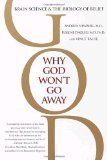date newest »
newest »
 newest »
newest »
message 1:
by
Sally
(new)
Apr 10, 2011 11:17AM
 I'm always suspicious of attributing such benefits to "religion" or "belief in God." For example, in "How God Changes Your Brain: Breakthrough Findings from a Leading Neuroscientist" by Andrew Newberg, research in fact indicated that thinking about any deep or challenging matter has the same effect on the brain as believing in God, secular meditation or deep rumination has the same benefits as religious meditation/prayer, and being actively involved in any supportive social group has the same benefits as belonging to a church. In other words, it's not religion and belief in God particularly (or uniquely) that are giving the benefits, they are simply a commonly used means, though believers may wish to give religion/God itself the credit as a justification for their faith and evangelical efforts. Again, looking to the human past, today's notion of God(s) and religion is a relatively recent development, coming after a long period of shamanism, ancestor-oriented rites, nature/fertility rites, and myth very different from the deity-centered religions and myths of many historic cultures. How easy it is to project our own ideas and concerns back onto the past!
I'm always suspicious of attributing such benefits to "religion" or "belief in God." For example, in "How God Changes Your Brain: Breakthrough Findings from a Leading Neuroscientist" by Andrew Newberg, research in fact indicated that thinking about any deep or challenging matter has the same effect on the brain as believing in God, secular meditation or deep rumination has the same benefits as religious meditation/prayer, and being actively involved in any supportive social group has the same benefits as belonging to a church. In other words, it's not religion and belief in God particularly (or uniquely) that are giving the benefits, they are simply a commonly used means, though believers may wish to give religion/God itself the credit as a justification for their faith and evangelical efforts. Again, looking to the human past, today's notion of God(s) and religion is a relatively recent development, coming after a long period of shamanism, ancestor-oriented rites, nature/fertility rites, and myth very different from the deity-centered religions and myths of many historic cultures. How easy it is to project our own ideas and concerns back onto the past!
reply
|
flag


 by Andrew Newberg, M.D., Eugene D'Aquili, M.D, Ph.D., and Vince Rause
by Andrew Newberg, M.D., Eugene D'Aquili, M.D, Ph.D., and Vince Rause

